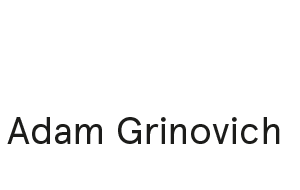
‘Random and perversely ideologically motivated attacks on life will wear down complex aesthetics and, as you eluded to a reversion to basic elemental art/music/life, and you are right, the moment rules thought, hell, why think too much.’
This was my father’s response to an email rant that I wrote him questioning the spirit of the age that we are currently living in. I was experiencing that kind of schizophrenic anxiety that comes with trying to understand my place in a world I couldn’t properly define. Perhaps I was being presumptuous, but I had the feeling that I was in the midst of a cultural shift and I had the desire to be dealt some wisdom as to how to interpret the indications of change. To develop this investigation I saw two ways of going about it: either I could buckle down and attempt to delve into complex philosophical analysis, or I could try and gather some of the people who I’ve come to know and respect to get their take on the matter… I chose the latter. The topic is Change… nothing to be taken lightly. The leader of the free world used it as a one word slogan in order to campaign himself into two terms of the United States presidency.
Five people of various ages, backgrounds and professions were assembled as participants and the challenge was to try and create both a structure and a form sympathetic to all of the individuals involved. Digital communication has become a global standard – chat rooms and forums have been around since the days of dial up modems. They’re about as rudimentary as online technology can get. Forums and online chatting in general owe their success to the fact that they provide a level playing field for all members involved.
The forum format restructures traditional modes of dialogue by removing personal charismatic dominance and reduces a conversation to lines of text that can be contemplated, refined, and then submitted. The forum also has an Achilles heel, for nearly the same reason that gives it strength. How and why people come into contact has a great deal of influence on a particular relationship. At its worst, the forum can function as an impersonal fish tank where all is on display and those with the closest affinities to the medium take presidence over the ones less inclined to sit in front of a screen and voice their personal insights. I harbor a sense of hope and excitement for these new forms of ‘social media and entertainment’ (reddit.com is a good example that comes to mind). A generation is dawning that has been raised on high speed Internet and digital networking.
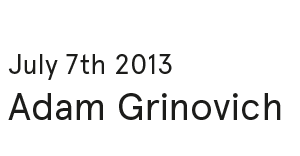
We live in a world of constants and variables: things that stay the same, things that change. Generally speaking, change is usually brought about by some force, an impact. This impact could be as mundane as a subtle inner feeling or as monumental as a world war. An interesting element of change is its relation from what was, to what is, to what will be; it embodies a range of emotions from severe nostalgia to unbridled hope. Development, decay and everything in between. I was thinking about the idea of change and how decades stand for specific markers and cultural definitions. It’s a strange phenomenon. The 70’s had a hippy movement and aesthetic, 80’s neon, electronic instrumentation, 90’s had grunge culture and a widespread sense of apathy, the birth (and death?) of generation X. I still have the unreasonable sense that on 1 January 1980 people woke up to a world that looked, sounded and felt entirely different. I realized that this way of thinking has conditioned me in a way to think about cultural shifts in 10-year periods.
WHAT DOES CHANGE MEAN TO YOU?
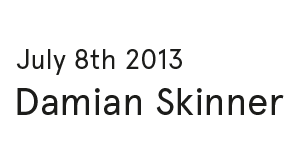
Every generation articulates a moment in which the world changed. The English author Virginia Woolf wrote that “On or about December 1910, human character changed.” I’ve always loved the entirely unreasonable specificity of that date, so I’m inclined to feel warm towards your claim that 1 January 1980 marks an epochal moment in human culture, and that waking up that morning was to encounter a world transformed from how it had been the day before. But I also find it interesting that you stop describing the 10-year cultural shifts when you get to the 2000s, presumably because it becomes too hard to get an historical perspective on the times in which you’re a participant. How would you define 2010 onwards as different to 2000 onwards? Can you identify change while you are experiencing it? I’d say you can, but it can’t be narrated until it becomes history and therefore distant and other in some way. The oracle in The Matrix films says that we can’t see beyond the choices we don’t understand, and I’ve often thought that is a really useful idea. Maybe in this instance I would translate that as: change becomes history the moment we can articulate what it means, or the character of its difference to what came before. As to what kind of role a critic or writer or curator has in contributing to change, we all hope that we might say or do something that will prove influential, but I don’t know if this ever stops being more than desire on the part of the critic to imagine they make a difference. There are many different ways I would like various cultural practices and art worlds to change, and I can articulate and agitate for this change to take place, but there is no guarantee that will make any difference. Then again, some change is about ideas or philosophy (e.g. this is what I think is going on), and some is about what you do or how you behave (e.g. I think we need more critical discourse in the field of contemporary

Decades and Changes have nothing to do with each other, except that some people need or wish to put everything in boxes, in pigeonholes, to categories everything, to create –isms. Decades (as well as centuries and millenniums) are a western invention based on the decimal system. Far over 2/3 of the worlds population have their own and different calendars. But yes, I also use phrases like: this is typical 50’s. Changes are subtle and happen without even noticing, and in their accumulation one day they may hit you like mad. Changes are noisy, big, frightening and overwhelming, but after all not much may actually have happened. Some changes are wonderful and refreshing and somehow has something when really changed. Certain things I try to change but repeatedly fail to do so. Some other things I wish so much to keep but don’t manage, they change against my will, and looking back it was not always the worst thing that it changed. When I repeat a piece it is never the same. Therefore something must have changed. Therefore I never call repeating ‘repeating’ but instead renewing. I changed almost 100 silver coins from about 40 countries by erasing both sides, head and tails. Queen Elisabeth had to go, Mao got removed, and I filed of the Pope as well as Steffi Graf. I transformed all the silver discs into pendants and named the project Change. Every moment something is changing. And I change all the times something somehow. Therefore I am. When I watched the towers in New York coming down, life and from not so far away, a lot changed, but my life didn’t. When I was sixteen, my six years older brother died and my entire life changed forever.*
* Sorry for my long statement – it is the first and the last for this project – because I have just decided to make another change and to quit my participation. Adam, next time when we enjoy a drink together, I will tell you why (it got nothing to do with you). All the best/Otto
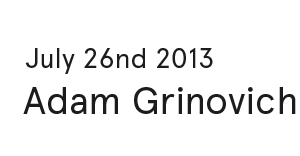
To take it in a personal direction I believe that these sentiments towards change have made me very attracted to things that are resistant to change. Take for instance a bicycle, a form that never needs to change, or a format that will never change like having a drink at a bar, which people have done forever and will continue to do so forever. It’s like looking at the periodic table of elements: there’s no possibility of seeing it another way.
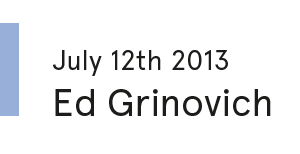
Cultural change is, from my seat, an adoptive process on a grand scale. An event, an idea, a perceived event or a non-event, is circulated, discussed, redefined and articulated a thousand times, and the general view of the populous of any region accepts the thing as part of the current culture. There are overwhelming events that drive a culture to some change, war, disease, ideological waves, but those are both unavoidable and not an indication of what any culture has agreed upon is a representation of their understandings.
On a trivial level, perhaps not so to some, fashion is one of those cultural icons we paste on an era. No one decrees fashion, it is simply the adoptive resolution of the majority that some particular style is the iconic representation of the ‘generati on’/era/ culture, thus, every other person has some iteration of the fashion on, for as long as that style is determined to be representative. When a new fashion displaces the prior, the old is a landmark to history and the new is the new true symbol of the culture. I do not minimize the importance of events, but events effect the individuals affected, not the whole, some events are human landmarks and force change on many levels, but that event needs to be so huge that the majority needs to accept the obvious conditions implied or enforced by the event as drivers of their current culture.
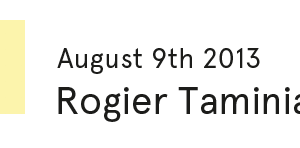
In a way I’m anti-now. I’m interested in periods where television did not exist. I’ve heard this theory that color television was responsible for the bright colors that the hippies wore in the 70’s. This switch from black and white to color influenced the fashion… Of course with the drugs and music, that probably didn’t have much to do with color TV. It was about reactions… that grunge was a reaction to whatever came before it.
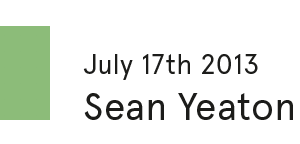
The tool of influence that crafts change is perception. Time is a way to measure change, but I believe it is perception that governs (commissions?) acts of change. This notion, for me, requires the consideration of alternate realities and universes that perhaps exist as an analog to our own current perception of the present (how it will or WE’D LIKE it to impact ‘Change’). The seeds of these alternate realities still exist in our current perception of the present they have perhaps only not sprouted as much as others. This, in a way, relates BROADLY to the notion of JUMPING THE SHARK: The eponymous example of THE FONZ from Happy Days using water skis to jump over a shark in the show HAPPY DAYS marks the decline of the program, which begs its audience to wonder what COULD have been and implies that CHANGE, in an irreversible sense, can not be simply GOOD or BAD but can only be.
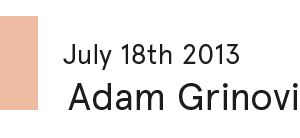
I can personally say that most of the changes in my life so far have been due to a source that I could locate, and I know that my age has a lot to do with that. We are all living right here and now, and that dictates a tremendous amount of free will. We have the ability to make choices and take responsibility for the consequences. I read an article some time ago that was on the theme of choice, and it illustrated that the idea of choice is a fairly modern concept. In earlier western eras it was thought that God willed everything that occurred in the world, so the idea of choice was moot as it was a higher power that had full control over the fate of mankind.
Ok, so what I’m really questioning is: What is the constant? Quite some time ago we talked about the idea of the glue that keeps this world together, the idea of this mutually understood etiquette that stops someone from behaving in a completely abnormal manner. To quote a rather trite cliché “the more things change, the more they stay the same” Its crazy right… I think that when I was a child I expected things to be a lot more different now than they are (technologically, culturally, globally etc.). What happened?
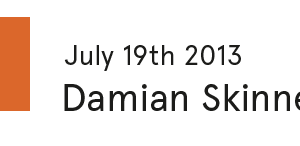
I recently read a short story by science fiction writer Greg Egan about the multiple universes theory, in which there are an infinite number of worlds in which different consequences unfold from the choices we make – therefore, no choice is ever final or determinative. In effect, there is no free will, since all possible outcomes will be played out by the different versions of you spread across the different universes. The protagonist decides to create an artificial intelligence child who, with the aid of technology that I couldn’t understand or repeat because the math and physics were beyond me, would make choices that would be final, because they would be singular – cut off from the multiple universes, there would only be one individual, in this world, making decisions and experiencing the consequences. His need to create this child emerged from his sense of helplessness, his feeling that free will didn’t exist because whatever he did would, when considered from a perspective that took in all the multiple universes, have no impact. (All possible outcomes would be happening to a version of him somewhere.)
Certainly, when you start thinking about change and what it means, it can induce a kind of philosophical vertigo. At the beginning of this conversation, I would have said that I knew what change was, and how to induce it – and that the only uncertainty was around its effects. But when you begin to think about it, you start to see infinitely regressing and progressing chains that make change a complicated proposition. It seems arbitrary as to what you choose to identify as the states before and after change, or the action that causes change, or the consequences.


This article was first published in #2 Youth Issue, Current Obsession magazine, 2013
The issue is sold out



